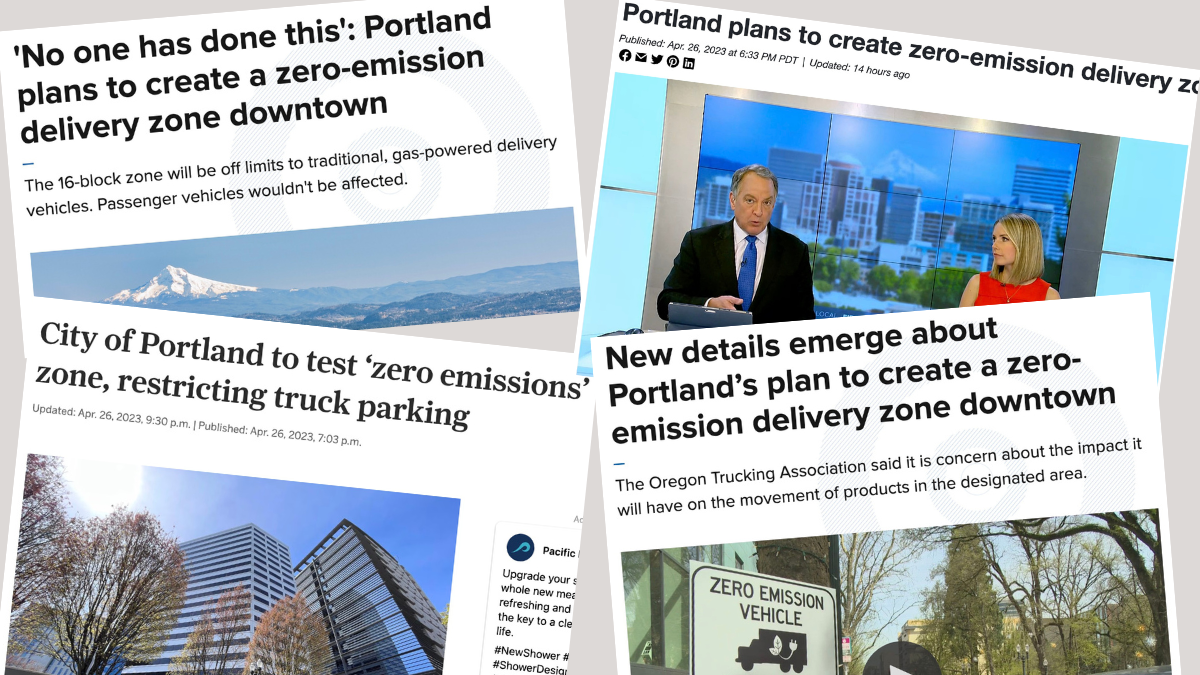
“We’re learning more about a controversial proposal that would reduce Portland’s carbon footprint while also adding an extra burden to struggling downtown Portland businesses.”
– KPTV news anchor
In their zeal to create controversy and feed their audience a narrative that makes the City of Portland look bad, many local media outlets have completely mischaracterized a new project launched by the Portland Bureau of Transportation on Wednesday. What is a relatively minor shift in how a few parking spaces will be regulated, is being framed as a sinister scheme by PBOT to ban trucks across a swath of downtown Portland and hurt local businesses at the same time.
As we were first to report on Friday, PBOT has won a $2 million federal grant to experiment with a “zero emission delivery zone.” Portland was selected as one of nine cities across America to partner with the US Department of Transportation on their new, Strengthening Mobility and Revolutionizing Transportation (SMART) grants program. We’re getting money from Uncle Sam to do something innovative that will improve air quality and make streets downtown safer. That’s it.
Before I critique the local media’s handling of this story, I’ll explain what we know so far about the project:
The details of the project are still being ironed out, but the basic gist is that PBOT will set aside a handful of loading zones outside three government buildings — the Portland Building, the Wendell Wyatt Federal Building, and the Multnomah County Courthouse — where only zero-emission delivery vehicles will be allowed to park. So far it looks like under a dozen loading zone parking spaces will be part of the pilot project, and all of them are in front of government buildings.
Also as part of the project, PBOT will work with B Line Urban Delivery (a company BikePortland readers are very familiar with) to encourage some freight companies to use B Line’s warehouse in the central eastside (on SE 7th) as a drop-off point where loads from larger, diesel and gas-powered trucks can transfer freight to smaller EVs (like B Line’s cargo trikes) before entering the central city. The other element of the project is that PBOT will use a bevy of new technology tools (“data from logistics companies, sensors, and third-party analytics companies”) to analyze and evaluate what happens at these zero-emission loading zones.
That’s pretty much it. But if you only caught a segment on a local network news TV station, you’d think PBOT was banning trucks downtown.
“We’re learning more about a controversial proposal that would reduce Portland’s carbon footprint while also adding an extra burden to struggling downtown Portland businesses,” said a very concerned-looking KPTV anchor. “One business owner is concerned this might cause financial impacts that could drive businesses out of the area.” KPTV (Portland’s Fox affiliate) interviewed two different business owners who panned the idea — neither of whom’s businesses will be remotely impacted by the project.
The Oregonian headline said, the City of Portland would be, “restricting truck parking.” Their story was fine and straightforward, but that headline isn’t really accurate because trucks aren’t restricted at all — just gas and dieseled-powered ones.
KGW got it totally wrong. Their headline blared, “No one has done this” and then their lede stated, “The 16-block zone will be off limits to traditional, gas-powered delivery vehicles.” Both of those statements are false. A city in Los Angeles piloted a zero emission delivery zone a few years ago. (It is a bit confusing that PBOT is saying this is a “first” in the nation; but I think they’re claiming that it’s the first “regulated zone,” or one that will actually be enforced with citations (the L.A. pilot didn’t have an enforcement element)).
KGW was so eager to gin up opposition to the idea they did a second story about it where they gave the president of the Oregon Trucking Association, Jana Jarvis, a platform to pan both PBOT and the project. Jarvis is the most influential trucking advocate in Portland and the state of Oregon. She chairs the PBOT Freight Advisory Committee (despite being termed out and serving long after new city rules allow) and is a member of the ODOT’s Mobility Advisory Committee (the rogue committee that has repeatedly overstepped its authority).
Here’s the exchange with Jarvis in the KGW story:
And some groups are already raising concerns about the impacts of the plan.
“We still don’t know what the zero-emission delivery zone parameters are or who will be affected by this unilateral decision, but we do know that zero-emission vehicles are not available for broad application in the trucking industry,” Jana Jarvis, President & CEO of the Oregon Trucking Association, said in a statement.
Jarvis, who is also chair of the Portland Freight Committee, said that the city applied for the grant last fall, but it was never mentioned in any committee meetings since then.
“The trucking industry is deeply disappointed by the lack of transparency from the City of Portland, and is very concerned about the impact this will have on the movement of products in the still undefined area,” Jarvis said.
First, Jarvis can’t claim to be blindsided by this project because it was included in the PBOT 2040 Freight Plan (on page 6 of this PDF) which was developed by the PBOT Freight Advisory Committee she chairs and discussed numerous times at meetings she attended.
And again, PBOT has simply announced a grant award and all they’ve shared is a basic outline of what the project might look like. So of course all of its impacts are unknown. To say however, that PBOT hasn’t been transparent and to share criticisms like this at this stage just seems very unfair.
KGW has a history of terrible transportation stories. Recall back in December when they followed the same formula in their outrageous hit piece on the new protected bike lanes on SW Broadway?
Another problem with how this project was covered by local media is that only one outlet (The Oregonian) even mentioned one of the biggest reasons it’s being done: safety. Drivers and their large trucks have claimed the lives of many Portlanders over the years. Reducing the size of trucks — especially downtown — has been the focus of numerous advocacy efforts over the years.
At yesterday’s press conference, Senior Advisor of Research & Technology at USDOT Ben Levine said, “Projects like these show that addressing safety priorities and addressing climate priorities are the same are two sides of the same coin…. This project asks and answers a critical question. How can our cities and communities best use public space to serve the needs of their residents in fostering safe places to move healthy places to live and vibrant places to be?”
And PBOT Commissioner Mingus Mapps (at his second positive news press conference for PBOT in as many weeks) got it right during in his speech in front of City Hall yesterday: “Electrifying our transportation system — from bikes, to personal vehicles and freight trucks — is critical… and will make our city healthier and will fight climate change. The closer freight operators get to zero emissions, the better it is for everybody. The safer streets will be, the less congestion we will have, and the less pollution we will breathe.”
So let’s get it straight: The sky isn’t falling, it’s just getting less toxic.
Note: I will say that the PBOT communications team didn’t do themselves any favors with how they rolled this project out. I feel like they might have rushed it to coincide with two transportation-related conferences that were in town yesterday an the fact that some USDOT staff were in attendance. Stay tuned for more coverage as this project gets fleshed out. There are some very interesting details I’m eager to learn and share more about.



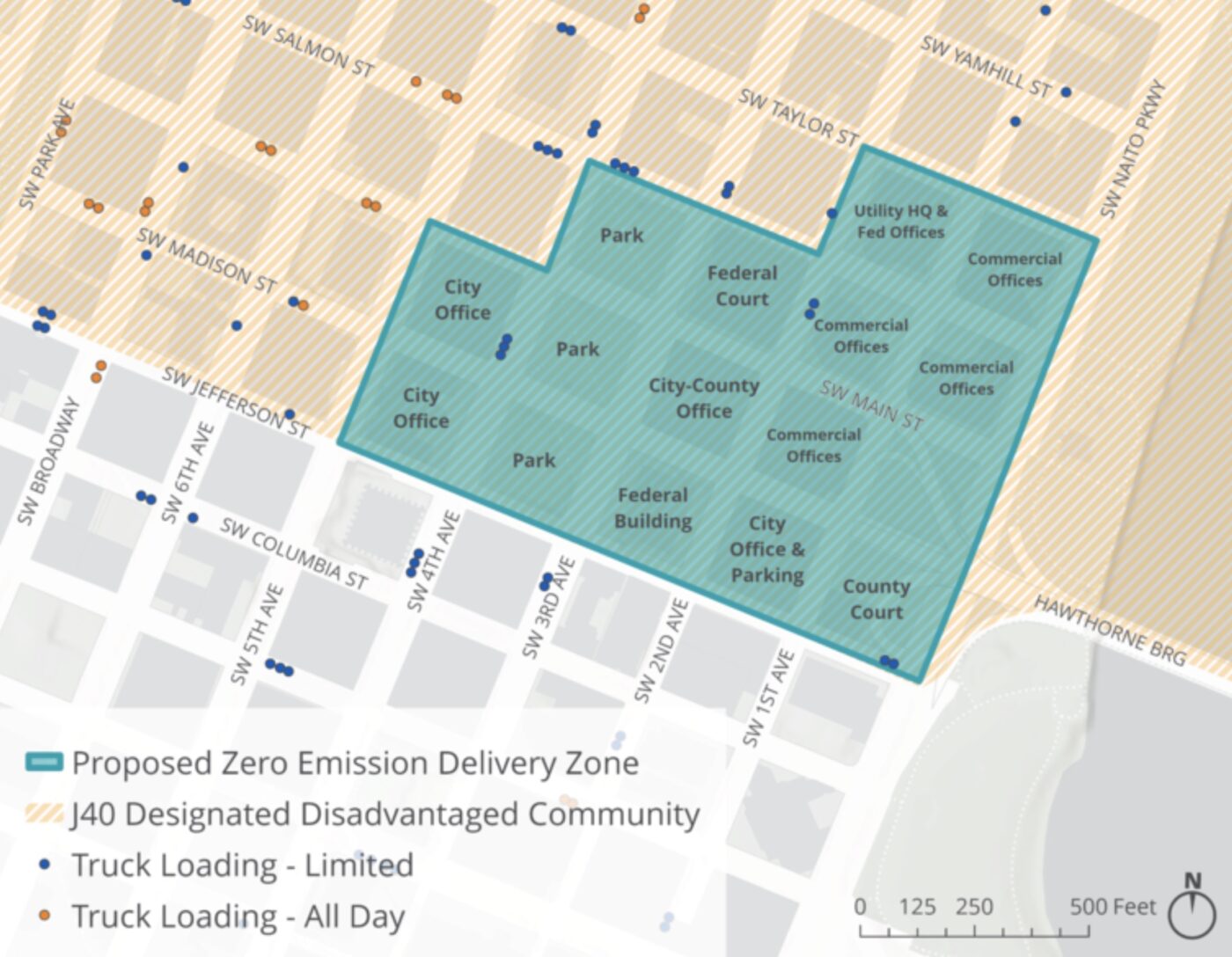
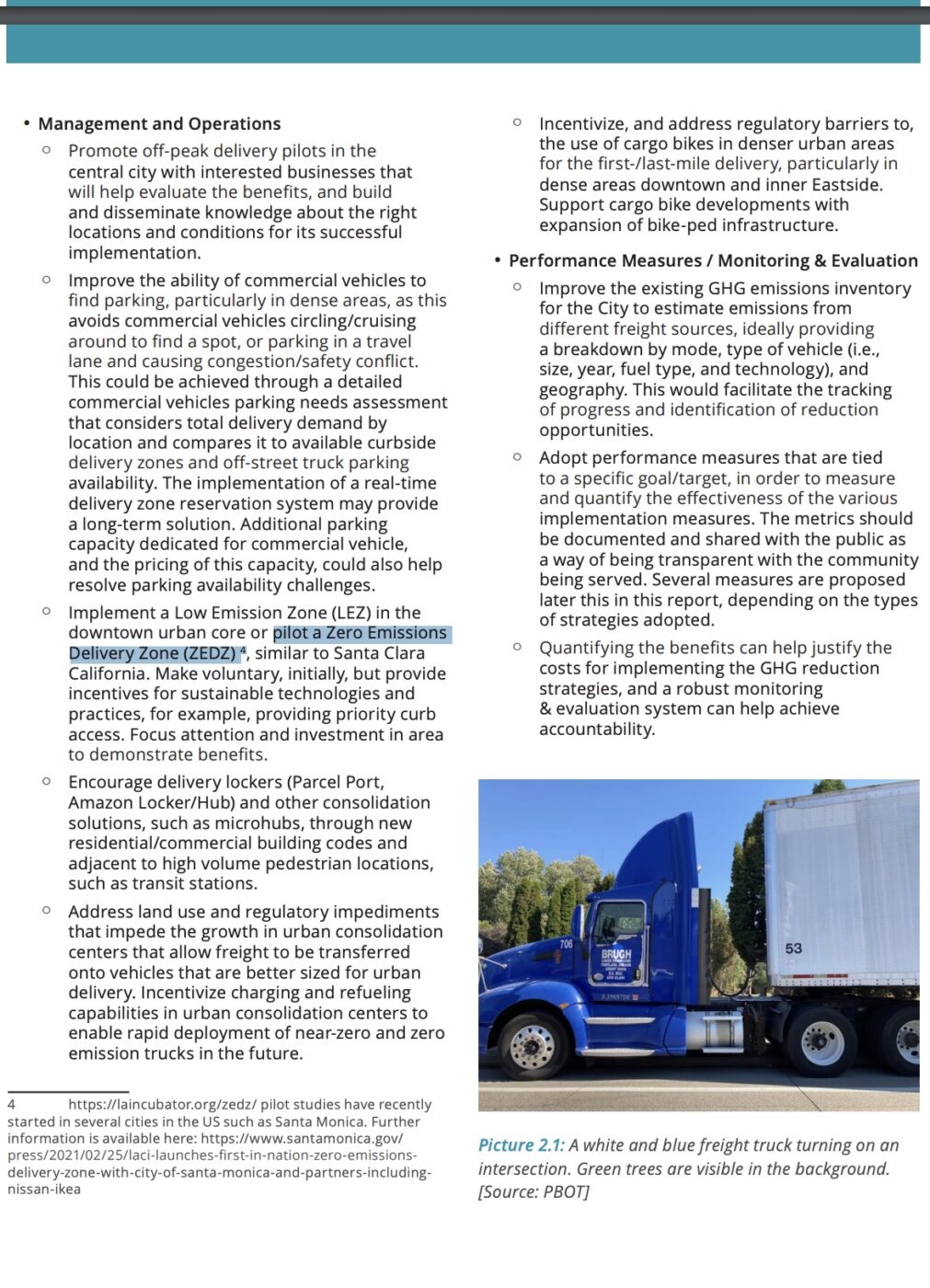
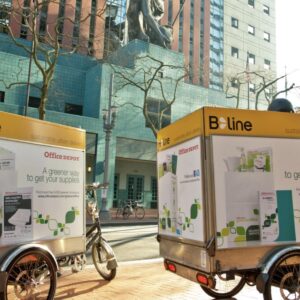

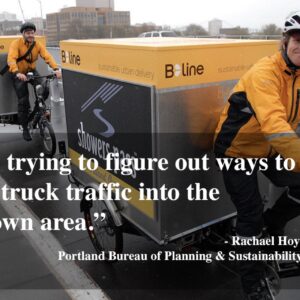
Thanks for reading.
BikePortland has served this community with independent community journalism since 2005. We rely on subscriptions from readers like you to survive. Your financial support is vital in keeping this valuable resource alive and well.
Please subscribe today to strengthen and expand our work.
Yeah it really is annoying to see our local media outlets misconstrue this so blatantly. Interviewing business owners who won’t be affected by the change is journalistic malpractice.
And seriously all these apocalyptic stories for like 10 total loading zones? Good grief. Do any of the fine folks who work churning out these stories stop to consider if their hyperbolic reporting is doing anything to degrade the fabric of the city? Or are they content to capitalize on the “Portland bad” media environment as long as possible?
it is annoying! I want people to know that the way local media covers this stuff has a real impact on our city and the people who live hear and who work for us. Do better KGW, KATU, KPTV, KOIN!
Also, was nice to finally meet you at Happy Hour last night blumdrew! Great to put a face to a commenter name.
Don’t lump KOIN in with your “do better” sentiment Jonathan! They covered it factually:
https://www.koin.com/news/portland/portland-to-ban-gas-powered-delivery-vehicles-from-16-blocks-downtown/
i disagree. I think most people who read that story will think incorrectly that gas-powered trucks are banned from a 16 block section of downtown. That is absolutely not what is going on here! Gas trucks can go anywhere they want… Except for a few parking spaces.
Agree with Jonathan. It is getting the full treatment on NextDoor right now with the KOIN story featured.
When they’re willing to go so hard on the misinformation on this story in such a coordinated-seeming way, it really makes one skeptical of all the other single-voiced narratives they push. Well, like you said, all the “Portland bad” stories.
I’m not necessarily against this program (especially since the feds are paying for it!) but I am concerned about the difficulty for small businesses to stay afloat downtown in the “new Portland”.
I also find it ironic that though Portland touts its commitment to carbon reduction, meanwhile businesses (REI, Walmart, Starbucks, etc) are closing their Portland locations forcing us to schlep farther and farther (often driving) to make needed purchases. Oh vey.
Come on, if Starbucks closing a few locations in Portland is making it hard to get coffee I’ve got some oceanfront property in Nevada to sell you.
> concerned about small businesses
> lists multi-billion dollar national companies
It is possible to be concerned with the viability of small businesses and also to want large business shopping options that don’t require a car trip to the suburbs.
(For the record, I have no problem with the loading zones.)
Here’s some smaller business closures.
Happy now?
Floating Comics
Coava Coffee
Margulis Jewelers
Zim Shipping
Oregon Chai
Green Zebra
Hotlips Pizza
Food Front Coop
Compound Gallery
StockX
Ben and Esther’s Jewish Deli
American Steel
https://www.bizjournals.com/portland/news/2022/12/08/downtown-portland-business-relocation.html
https://www.foxnews.com/media/coava-coffee-close-downtown-portland-location-due-extreme-violence-crime
Food Front is closing because the GM is stepping down and there is no replacement. Not exactly indicitive of larger economic trends. It’s also not downtown!
Food Front is closing because they’re broke. They’ve been hovering on the edge for some time, and have apparently fallen off the cliff.
Almost all of them closed down stating reasons like inflation and labor shortage, and only a couple of them were downtown. Not really sure the point you are trying to make. Is the City of Portland suppose to tackle inflation and the costs of goods?
Of course many businesses failed during covid, and even more are failing because of inflation and labor shortage. Thats not the downfall of Portland that so many people try to paint a picture of.
Why not? If they can pretend to tackle “climate change” then the sky’s the limit.
All we need is a couple more cross-country flights to attend the press release.
90% of new businesses fail. Others open up to take their place. Happens all the time, not exactly an apocalyptic scenario.
“Oh no, I’ll have to continue going to the closest coffee shop which still isn’t Starbucks!”
Heck, Starbucks is the one with the drive-thru locations, if anything they promote driving.
I’m sure Starbucks would never blame crime rates while secretly closing locations to retaliate against workers trying to unionize. Why, that would be illegal XD
So why do you think it will eliminate large trucks from making deliveries in this zone. There are medium duty EV Trucks being built right here in Portland (Freightliner).
Since all of the loading zones are for city owned buildings it seems like they can make it happen by just having the buy-in from the city itself which it seems like they already have, plus they’re including enforcement as part of it per the article. If it was just for a bunch of random businesses then I could see the businesses not caring and doing their usual thing but that’s not what this is.
Can someone explain what the real benefit would be? I understand fossil fueled trucks will not be able to park and unload within the zone but such vehicles plus passenger cars/trucks/SUVs can still transit the area unimpeded. Are those rigs idling while the deliveries are made? I wouldn’t think that a semi-truck or a large box truck is left running and unattended.
Will that make a real dent in air quality or is this just another “Look! We’re doing something!!!” public relations project? Would it not be more beneficial to just ban delivery vehicles over a certain size/weight from the downtown core and/or restrict deliveries by fossil fueled vehicles during certain hours? Mandate zero emission vehicles after a certain date so that fleets can be acquired, hubs built, and cost structures developed?
I agree that the media are not being fair but, PBOT just keeps giving them opportunities to grab viewers with sensationalist tactics and interviews with “beleaguered” small business people. Every time that the city does something as a pilot or piecemeal, it just results in death by a thousand cuts. If you are going to get smacked by the media, then at least take a punch after announcing something meaningful like electric vehicles only after January 1, 2025, congestion pricing, or tolling of fossil fueled vehicles beginning in 2024.
So large trucks regardless of fuel source will still be able to use the loading docks at every building within this zone?
I’ll quote their weatherman Mark Nelsenin in saying that KPTV is a Fox affiliate, but their news dpt has no connection to the horrid national Fox News.
The part that interests me is why it costs $2 million to do this.
If we’re simply talking designating a few parking spaces, referring freight companies to B-Line, and collecting data, it isn’t clear to me why PBOT can’t do this on its own, without needing federal money.
$2 million is equivalent to the cost of ten full-time, very well paid including full benefits and taxes, PBOT staffers for an entire year.
It costs $2M because that was how much they could get a grant for. This (like TriMet’s FX bus) is a grant-driven project, essentially something motivated more by the money than by the thing itself.
While I understand this model of grant-driven-planning, it feels very mercenary.
Thanks for explaining. It’s even dumber then KGW described it.
The cognitive dissonance of this statement after the torrent of “electric vehicles won’t save us” anti-electrification agit-prop on bike portland is astounding.
And for the record I view the hulking and monstrous EVs being sold today as being a two step forward and 1.9 steps backward situation. It’s pathetic and kafkaesque that the only two lighter-weight EVs (Nissan Leaf and Chevy Bolt) are being discontinued and replaced with hulking suvs. It’s not EVs that won’t save us but rather the absolute love affair americans have with portable living rooms (e.g. Stupid Utility Vehicles).
Electric vehicles may or may not save us (I’m skeptical) but regardless, freight still has to be moved around and much of that would be difficult on a bicycle. People skeptical of a 1:1 conversion from gas to electric vehicles (me) don’t think that means the future won’t still have a place for them, even for some personal use.
EVs are necessary but not sufficient for us to be “saved”.
And in a backward and primitive nation like the USA they may end up being the primary mechanism by which transportation emissions are lowered.
I agree with your conclusion — people like the flexibility and efficiency (on a personal level) of driving.
I too enjoy spending hundreds of dollars every month on a depreciating asset so I can spend hours every week unproductively sitting in traffic. Such efficiency!
Downtown is struggling. Office buildings are going empty as leases expire. Shops and restaurants are closing. It doesn’t feel safe to walk around at night because the crowds are gone. There’s several reasons, but Portland’s increasing tax and regulatory burden on businesses is part of what’s making them look for new locations. Any new restrictions on business are going to be viewed negatively, even if it’s only a dozen parking spots. This proposal might be good, but it seems tone deaf to what’s happening in downtown right now.
Clearly the message hasn’t landed. I had a beer with a couple of friends last night, all of whom I would characterize as non-political, generally intelligent people, and they 1) had all heard about the loading zone (which shocked me), and 2) all thought the idea was crazy, even after I explained it a bit more.
This will make deliveries to this area cost more as freight will have to be transferred to a legal and smaller vehicle. Try emptying a 26′ box van into a bicycle with a cargo basket.
I’d like to see downtown completely car-free, with truck & van deliveries limited to certain designated hours, and new infill housing to replace all the mixed-use buildings that were torn down and converted to parking lots. The path to downtown Portland’s current stagnation was laid decades ago when it was decided that it would be a place for people to drive into during the day and then drive out of again, rather than a place where people actually lived.